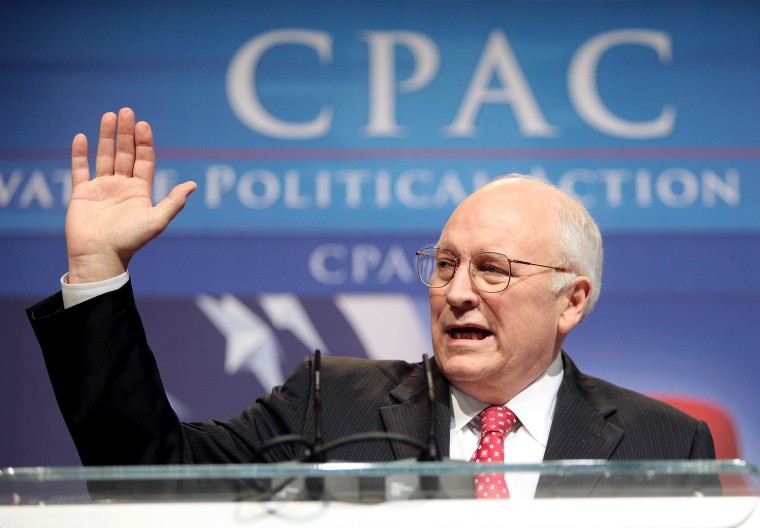The Dark Lord is back.
Of course, I'm referring to Dick Cheney. After suffering his fifth heart attack in February, the former vice president seemed to hunker down in his undisclosed location. During the previous months, he had emerged regularly to accuse President Barack Obama of undermining the national security of the United States. Repeatedly, he had claimed that Obama — who expanded the war in Afghanistan and who has stepped up the use of drones to kill Taliban and al-Qaeda operatives — was soft on the terrorists. Those dire pronouncements were cable-ready — that is, guaranteed to draw plenty of attention in the media.
Yet in recent weeks, Cheney was mute throughout various developments and controversies related to national security. When Obama signed a new START nuclear weapons treaty with Russia, some conservatives complained -- but Cheney said nothing. When Obama played host to the , Cheney didn't call reporters to denigrate it. When the Obama administration became snared in a dust-up with Afghan leader Hamid Karzai, Cheney held his fire — though his daughter Liz did not. And when Liz Cheney accused lawyers representing detained suspected terrorists of near-treasonous behavior, Cheney didn't join the fray.
After all this silence, it seemed a Cheney eruption was due. And one came last week. Actually, there was a double-blast. First, Cheney appeared on Dennis Miller's radio show, and when Miller fondly recalled the moment in 2004 when Cheney told Sen. Patrick Leahy (D-Vt.) to "f--- yourself," Cheney replied, "That's sort of the best thing I ever did."
More so than invading Iraq on a false premise or championing extreme interrogation methods widely regarded as torture? That was indeed a bold assertion. And how statesman-like. (Yes, children, in the United States of America, anyone can grow up to be a vice president then drop the F-bomb on a lawmaker — and afterward proudly claim it as an accomplishment.)
More important, Cheney that same day endorsed Marco Rubio over Charlie Crist in Florida's GOP Senate primary. He did so with his familiar edge. Referring to the possibility that Crist may bolt the Republican primary to run as an independent, he groused, "Lately it seems Charlie Crist cannot be trusted even to remain a Republican."
During his resentment-ridden post-vice presidency, Cheney has mostly stuck to national security matters — swooping in like a hawk when he sees the opportunity to peck at Obama. But as the congressional elections approach, is he angling to get mixed up in partisan tussles? Cheney has waded into other races. He backed Sen. Kay Bailey Hutchison's challenge of GOP Gov. Rick Perry in the Texas primary — and she lost by 20 percent. He also endorsed the establishment-favored Republican Trey Grayson, who is running against Tea Party Republican Rand Paul (son of Ron Paul) in the GOP Senate primary in Kentucky. (Sarah Palin is backing Rand Paul.)
How involved will Cheney get in this year's House and Senate races? (Palin has already targeted 20 House Democrats — though to their Republican opponents.) Will many Republicans want his support? Cheney did not leave office a popular fellow. Three months after his last day as veep, one poll showed that his favorable rating was a minuscule 18 percent. A more recent poll found that 56 percent still harbored an unfavorable view of Cheney, while only 38 percent had a positive opinion of him. (It's not that Cheney gained 20 points on the favorable side between these two polls. The first poll allowed respondents to say they were neutral regarding Cheney, and 23 percent chose that option; the other poll forced respondents to pick between negative and positive opinion.)
Can Cheney do Republican candidates much good? In the Rubio-Crist primary, he probably won't cause Rubio any harm. Rubio has a massive lead and is already the darling of those conservatives who might be impressed by a Cheney endorsement. Yet if Crist remains in the race as an indie, Rubio might not like to be seen campaigning with Cheney, for that could lessen his appeal for middle-of-the-road voters not eager to support a Tea Party conservative.
In other states, Cheney's thumbs-up might not be craved at all by Republicans. It's hard to see Cheney doing much good for California Republicans Meg Whitman or Carly Fiorina, who are running, respectively, for governor and senator. In Pennsylvania, Pat Toomey recently opened a lead against R-turned-D Sen. Arlen Specter. Would he want Cheney by his side at a campaign stop? And will Cheney weigh in on the contentious Senate race in Arizona, where former GOP Rep. J.D. Hayworth is trying to end the career of Sen. John McCain? (During the 2008 campaign, Cheney endorsed McCain, after it was clear McCain would be the nominee, and many political observers wondered if Cheney, realizing his own political toxicity, did so to undermine McCain.)
One top Democratic lawmaker tells me, "We would be blessed if Cheney threw himself into the 2010 campaign." That would indeed make it easier for the Dems to pitch one of their campaign messages: We're still cleaning up the Bush-Cheney mess.
As an interloper in the ongoing national security debates, Cheney has tried to appeal to the limited audience of hawkish Americans who believe the Bush-Cheney crew got it right on Iraq. These people probably do hold warm and nostalgic sentiments regarding the former vice president and appreciate his efforts to keep the crusade alive. Yet were Cheney to actively campaign for GOP candidates, he will be playing before a larger crowd: voters in general. For that group, he's hardly a hero. Consequently, he might have to choose his electoral interventions rather carefully — to make sure that the Cheney seal of approval does not become a Cheney kiss of death.
